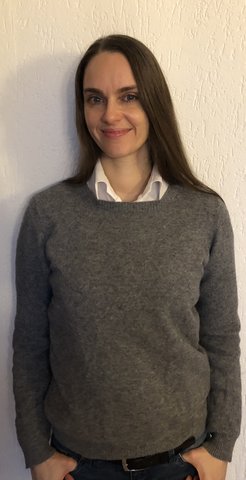Contributing to something important
Minerva’s daughters: Julia Jacobs works as a chemist in the NMR department
After completing her Master's degree at the University of Frankfurt, Julia Jacobs was looking for a job in chemistry. She found what she was looking for at the Max Planck Institut für Kohlenforschung. In our "Minerva's Daughters" interview, the scientist explains why she values her job at the MPI so much.

Julia Jacobs works as a chemist in the Institute's NMR department. She is responsible for measuring samples and, above all, analyzing them.
What brought you here? Tell us about your path to the Kohlenforschung!
Julia Jacobs: I did my Master's degree in chemistry in my hometown Frankfurt and I was looking for a job. On the one hand, I wanted to work in research, but on the other, I was mainly looking for jobs that didn't require a doctorate. Then I found an advertisement for this position in Mülheim and applied, as I was already interested in NMR during my studies. It was just the perfect fit!
What do you like about your work?
Julia: I like the fact that I can make a small contribution to something important with a job that I really enjoy. I enjoy analyzing the samples that we receive from the laboratories every day. We are always involved in new, very different projects and have to deal with new issues. I also feel very comfortable with my colleagues and can identify very well with my employer. I also like the fact that I have the opportunity to get involved in the institute's "Green Team". It allows me to remind my colleagues on campus about sustainability through various campaigns. I also enjoy digging in the dirt with my hands from time to time (laughs).
What are your professional goals?
Julia: I have already achieved my main goal of finding a job that I enjoy. Apart from that, I just want to keep learning new things to stay up to date scientifically. Science is constantly changing. In addition, learning something new always gives me a sense of achievement.
What has been your most difficult step so far?
Julia: Leaving Frankfurt to come to Mülheim was certainly the most difficult step for me. Frankfurt is my hometown, my family and friends live there. Moreover, making connections here in Mülheim wasn't easy at first. However, I feel at home both at the institute and in my apartment, and I have discovered some beautiful corners of the city for myself, for example down by the river. Unfortunately, I didn't manage to move the whole institute to Frankfurt (laughs).
Do you have a role model?
Julia: My female role model is the artist Frida Kahlo, because art plays just as big a role for me as the natural sciences. She was a special woman, her paintings have something magical about them. I am impressed by the way she mastered her life. Nevertheless, my husband is also a role model for me. He is strong, courageous, clever and always keeps a cool head.
What advice would you give to young girls who are interested in working in a scientific institution?
Julia: Young women shouldn't let their self-doubt slow them down and shouldn't listen to the moaning and groaning of others. Of course it is possible to fail. But not having tried something and having to ponder for the rest of your life whether you missed a great opportunity is no better. For me personally, studying chemistry was also a risk, but I have never regretted it. I always enjoyed studying and it worked out well. With hindsight, I would say that I could have had more self-confidence right from the start.
If you had one wish: What would it be?
Julia: I would wish for the people I care about to have a long and healthy life. I would also like to see humanity's greed and ruthlessness reduced to a tolerable level. In addition, I would like to see a German army that is so well equipped that it has a truly deterrent effect.










